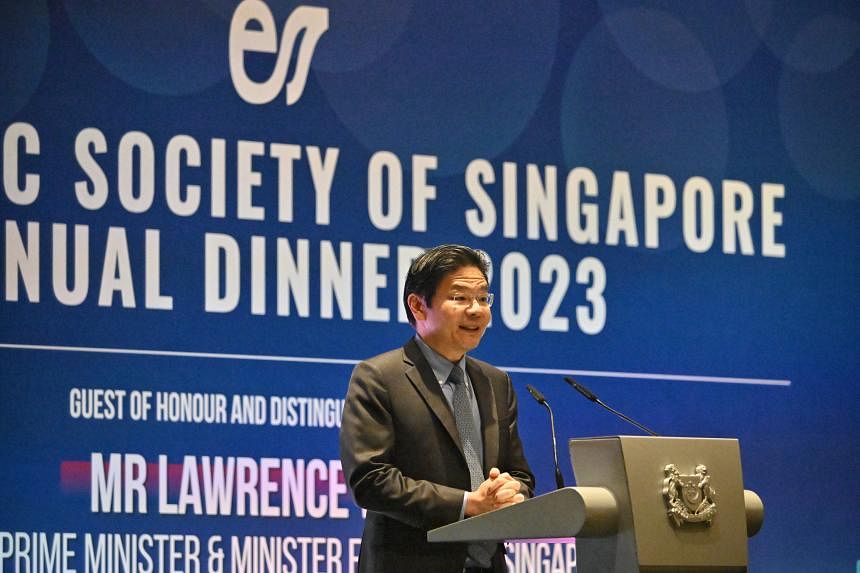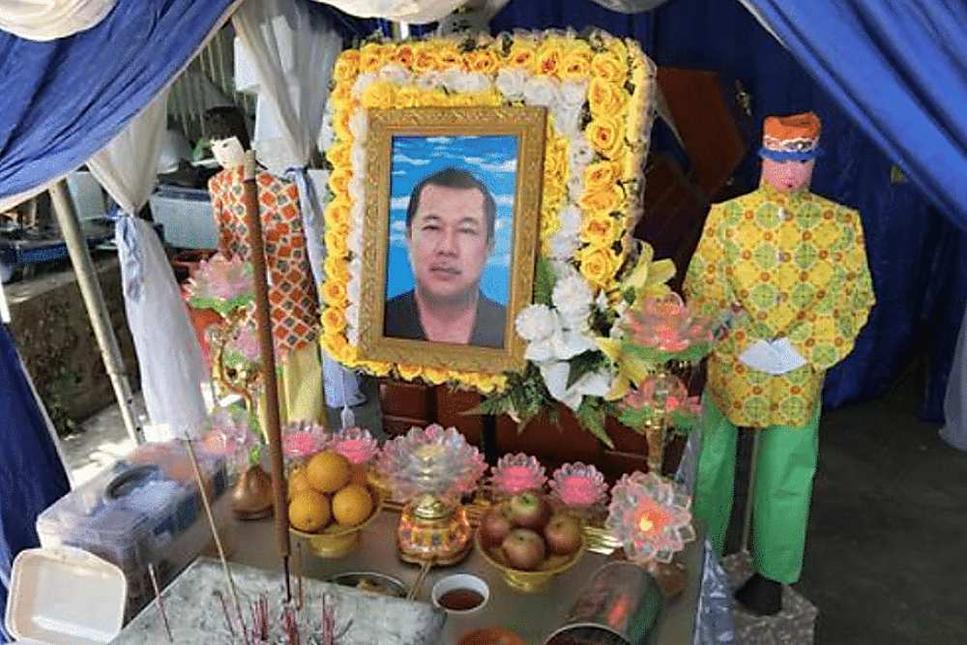The key to tackling Singapore’s challenges ahead

In his keynote address at the Economic Society of Singapore’s annual dinner on Sept 26, Deputy Prime Minister and Finance Minister Lawrence Wong outlined steps to tackle inequality and social mobility. But, he also noted, it takes more than government policies to keep the Singapore Story going. Here are excerpts from his speech:
There are significant challenges in the road ahead. They will have serious implications for Singapore and our future growth prospects.
Tonight, I will focus my remarks on how the Government plans to deal with the twin challenges of inequality and mobility, especially in a more challenging environment.
Advancing the well-being of the broad middle
Our first imperative is to advance the well-being of the broad middle – to help them secure good jobs and real income growth. Only then will they be able to tackle concerns over their cost of living, and enjoy rising standards of living over time.
The best way to achieve this is through a strong and dynamic economy. Looking ahead, we will no longer be able to achieve effortless growth. We will face more binding resource constraints. It means we have to work doubly hard to build new capabilities and restructure the economy. The churn will be painful. But it is essential, so that limited resources can be channelled to more productive areas.
Technology will be a key enabler. By leveraging on new, game-changing technologies like generative AI, we can drive innovation, productivity growth, and ultimately incomes, for our next bound.
But every new technology wave brings considerable disruption. The disruption from AI will be even greater than what we had experienced in the past. Many more workers, including PMETs, will find their existing job roles becoming obsolete. There will still be new jobs created. But it means everyone will have to be better prepared for multiple transitions in their careers.
The Government will need to do more to help our workers adjust to this quicker pace of change and churn.
We have already been investing heavily in lifelong learning and reskilling through SkillsFuture. But we can and we will do more.
We plan to step up investments in adult education and training, and significantly strengthen SkillsFuture. Some areas we are looking at include:
- Top-ups to the SkillsFuture Credit for mid-career workers.
- Training allowances for mid-career workers who take time off to pursue full-time training, such as longer-form courses.
- More support for career planning and guidance.
- Better job matching, to help workers move into jobs that better utilise and reward their skills.
We will also build on this revamped SkillsFuture system to provide support for workers who are involuntarily unemployed.
For a long time, the Government has been very cautious about introducing unemployment benefits.
But looking at the faster pace of change and churn in our economy, we have revised and refreshed our thinking.
We can have a government-funded benefit, appropriately sized, to help these workers tide through their immediate difficulties – while supporting them to continue with their upskilling and job search, and eventually bounce back stronger.
This is how we will continue to advance the well-being of our broad middle in Singapore – by giving them maximum support to stay competitive in their skills, and to take on new and better-paying jobs throughout their careers.
Tackling inequality and uplifting the lower-income
Our next priority is to tackle inequality and uplift the lower-income groups.
We are not doing too badly here. Our efforts have had a positive effect. Our income inequality, as reflected in the Gini coefficient, has declined steadily over the past decade.
We are also paying attention to wealth inequality.
Ideally, we would like to tax the net wealth of individuals. But it is very difficult to implement this effectively, because financial wealth is very mobile and difficult to track. Every country faces this problem, not just Singapore.
We have instead focused on taxing property, which is a key source of wealth for many in Singapore. Hence we recently increased our taxes on higher-end properties significantly.
We will continue to review and enhance our schemes to uplift the incomes and wealth of the more disadvantaged groups, and close our income and wealth gaps over time.
We are focusing on one key segment, which is our ITE students and graduates.
There has been a growing divergence between the starting salaries of graduates from ITE, polytechnics and autonomous universities over the past decade.
This is also reflected in the wage disparities between those who engage in more knowledge-based, or “head” work, like managers and professionals, versus those who engage in more “hands” and “heart” work, like technicians and service workers.
To be clear, we will not be able to completely remove wage disparities in the economy. But too large a wage difference will create problems.
We must do all we can to reduce these wage gaps, encourage more diverse pathways, and instil dignity and respect for every job, every vocation, and every skill.
We will do this industry by industry – redesigning jobs, raising productivity, upgrading skills, and establishing better progression pathways. Through these efforts, we aim to push up the starting salaries of our ITE graduates.
At the same time, we will do more to help our ITE graduates in their upgrading journey. By enrolling in a work-study or part-time diploma, they will gain industry-relevant skills, and secure bigger job roles with better pay.
Enabling social mobility, especially for disadvantaged groups
Third, we must ensure that our society remains socially mobile.
In particular, our focus is on children from more disadvantaged and vulnerable backgrounds, so as to prevent inequalities from being transmitted to the next generation.
We know that the early years are critical for a child’s development. That is why the Government has invested significantly in this area. We have KidStart. We have expanded affordable and quality pre-school places substantially over the years, with more subsidies going to the lower-income segments. We will continue to spare no effort in ensuring every child has a good start in life.
We are also making a concerted effort, through ComLink, to provide more holistic support to families living in rental flats with young children. We are taking a family-centric approach, where case workers and befrienders come together to support every family, one by one.
This requires a lot of effort on the ground. One way to better support this work is to provide additional support that is tied to specific action plans that the families themselves take responsibility for.
For example, if families take active steps towards achieving their own long-term goals, like staying employed, saving to buy a home, or ensuring their children attend pre-school and school regularly, then the Government could provide them with higher and longer-term financial payouts. This can help reduce their short-term financial pressures, while reinforcing their efforts to improve their life circumstances.
Nurturing a culture of philanthropy and giving back
So far, I have spoken about supporting the broad middle and uplifting the lower-income. What about those who are better off?
Take the top 20 per cent of households in Singapore. The 80th percentile earns close to $20,000 a month for a three-person household. That puts our high earners within the top 5 per cent, and some possibly even in the top 1 per cent, globally in terms of income.
But like all groups, the higher-income segments also face their share of stresses. Some of these pressures may arise because people compare their lot with that of others.
Studies have shown that people are often more concerned about their income relative to others’, than about their own absolute income. Happiness at your own pay vanishes very quickly when you learn that your colleague has been given more.
The implication is this: If the chase for more material success is motivated solely by social status and peer approval, it will be self-defeating. You may make more money, but because others do as well, you will never feel happier. A better way is to focus on your own life goals, and succeed on your own terms.
The top 20 per cent of Singapore’s society is the largest contributor to tax revenues. They sometimes feel that the Government is not doing enough to help them. But if you look at the broader picture, for the relatively low amount of taxes they pay compared with other countries, they enjoy many benefits in Singapore – a clean, green, orderly and stable society that works; excellent public infrastructure; good schools and tertiary institutions with highly subsidised fees; and opportunities aplenty to excel.
These are not small things. We must remember that a large part of our success is down to the society we live in. No one succeeds alone. We truly succeed only when we succeed together as a society.
So those who have done well in life should feel a sense of responsibility to help uplift their fellow citizens. We need to strengthen our culture of giving and philanthropy in Singapore. This must be an integral part of our social compact: Singaporeans enjoy the opportunity to generate and accumulate wealth, but part of that wealth must be recycled and invested back into society to expand opportunity for others.
Philanthropic giving in our society has been on the rise, but compared with other countries like America, we still have some way to go. In Singapore, and across all Asian countries, there is a deeply entrenched mindset to bequeath wealth to the next generation within the family. It is good that we want to look after our own families. But perhaps we should look at family in a wider context – not just our children or our grandchildren, but people in our wider community who belong to our Singapore family.
Our efforts to build a fairer and more inclusive society cannot be limited to just monetary redistribution by the Government. It must involve the community – to engage the human spirit, to provide personal fulfilment, and to strengthen collective well-being. It must strengthen the culture of responsibility for one another, so that we all feel a sense of duty to each other and not just a right to the benefits of citizenship.
Next phase of nation-building
These are some of the key ideas for Forward Singapore. It is an agenda for our next phase of nation-building, which has been co-created and shaped together with the many Singaporeans we have engaged over the past year.
In the end, this is not just about government policies, but about our collective actions – to nurture an ethos of solidarity and shared responsibility, where every Singaporean contributes and does our part to uplift our fellow citizens. That is how we can confront our challenges with confidence, and keep the Singapore Story going, for many more years to come.
Dive deeper into ST at $9.90/month
Get exclusive reports and insights with more than 500 subscriber-only articles every month. Start paying $9.90/month from Nov 1.
ST One Digital
$9.90/month
No contract
ST app access on one mobile device
Unlock these benefits
All subscriber-only content on ST app and straitstimes.com
Easy access any time via ST app on one mobile device
E-paper with two-week archive so you won't miss out on content that matters to you
Join ST's Telegram channel and get the latest breaking news delivered to you.




No comments:
Post a Comment